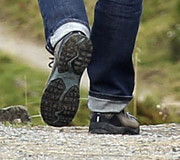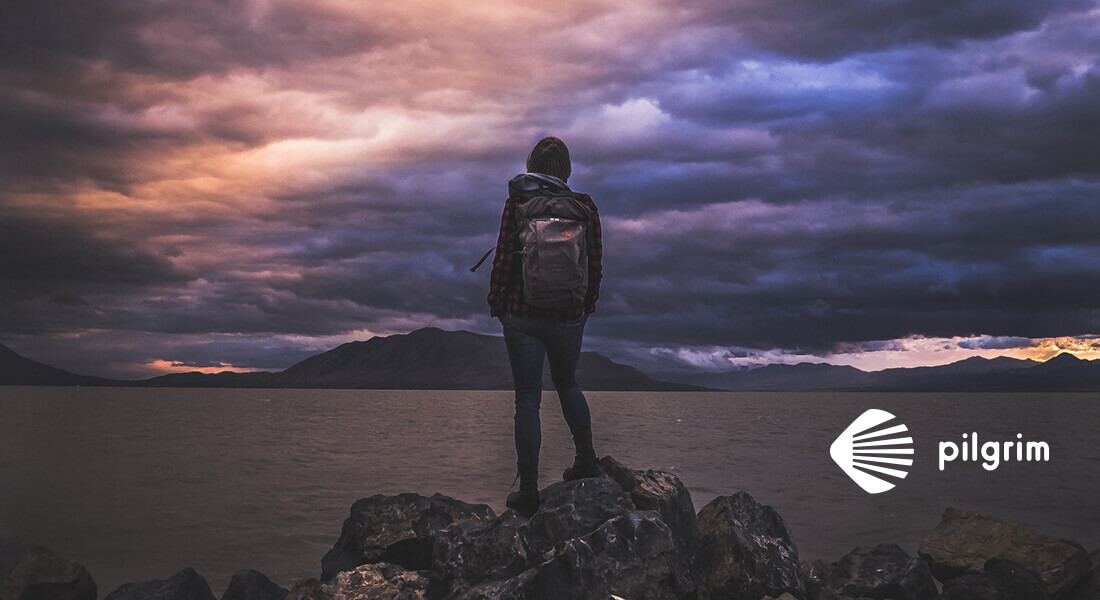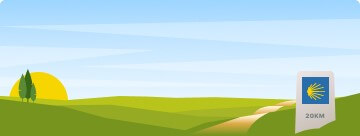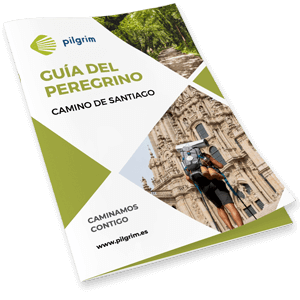One of the most important factors when arriving in Santiago de Compostela is the weight of our luggage. Often people make the mistake of carrying certain items unnecessarily and this ends up creating a problem.
YOU CAN ALSO BE INTERESTED IN : WHAT IS THE SUITABLE FOOTWEAR FOR THE CAMINO DE SANTIAGO?
On this basic list about what to carry on your backpack we will find a bit of everything, but specially essentials, always the lighter the better and not bulky so our body and our Camino would not be resentful and we can enjoy an optimum experience.
FIRST TO BEAR IN MIND
We have to have in mind the season in which we are doing the Camino, it is true that there are some essentials regardless of the season in which we will venture to walk the Camino de Santiago.
You must know that in all accommodations will find a laundry area where you can wash and dry your clothes, so you can have it ready for the next day.
Experts at Camino de Santiago, say that you cannot only distinguish a beginner pilgrim from a veteran at looking into his backpack, but also where this pilgrim has started the Camino.
On the contrary from what we could think at first, it is not the ones which starts from further the ones that bring the heavier backpacks, but the opposite, this are the ones who start at closer locations from Santiago.
This happens because the pilgrims which have still a lot of Kilometers ahead are aware that they will have to carry all his weight along a large number of days.
BEST BACPACK FOR THE CAMINO DE SANTIAGO
It is curious, but along the way, we can find plenty of pilgrims complaining about their backpack being too big, just a few times they complaint about being small, this is because a lot of people buys a backpack which is beyond their needs.
It is advisable that the backpack we are bringing to the Camino does no exceed more than a 10% of our body weight.
We are listing below the different backpack sizes, measured by liters of capacity so you can choose in detail:
- 35l: Ideal for those pilgrims which wish to go with the minimum along the way of the different Jacobeas routes, allows to do the walking on a much lighter way.
- 40 l: It is still small, but this 5 Liters extra could offer us the possibility of putting everything inside instead of having some items hanging on the backpack as the previous one. This is much used on the warmer seasons.
- 45 l: This is the middle one, maybe the most recommended for seasons like autumn or spring, I which the weather you could find is a bit unpredictable and you would want to take with you a mix of clothes.
- 50 l: We are starting the big category, which means we will be carrying extra clothes because the weather is rather cold and rainy. This makes this size of backpack one suitable for winter season.
- 55-60 l: The biggest one, only if you choose to do the Camino in winter season when the weather conditions are extreme.
For us, the backpacks should be between 35 and 45 liters at most.
If possible, anatomic backpacks, meaning, they adapt to your body and are light and flexible (Possible to adapt also the height of it).
To get to know if you have done a good choice, before leaving for the Camino, do this test: Take the empty backpack, tie it at the waist and leaving it without putting it on the shoulders… Does it still straight? Good shopping. Does it falls? Keep looking.
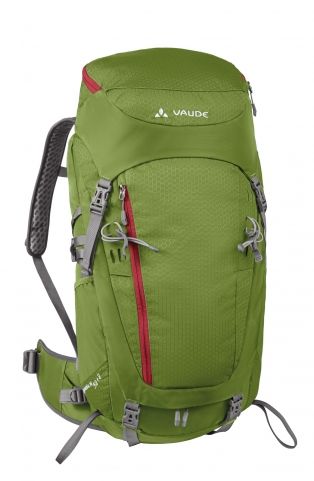
THE PERFECT SLEEPING BAG FOR THE CAMINO DE SANTIAGO
The perfect sleeping bag to take with you along the Camino must have the following requirements:
- Size: From 1,70 m and 1.95 m depending on your height. Remember, the bigger, the heavier will be on the backpack.
- Type of filling: The most recommended is the sintetic or fiber. On winter seasons, we could consider the feather ones, which offer more protection but their care is higher.
- Lightweight and compact: It must be able to adapt to the back pack and easy to tie it to it.
- Waterproof: It is possible you find some rain, so the sleeping bag should always be waterproof.
- Temperature: Due to the European standard EN13537 there are 4 types of sleeping bags depending on temperature. This will be indicated on the sleeping bag tag:
- Extreme
- Limit
- Comfort: The most recommended
- Max
In some of the accommodations will provide with sheets, but ou will thank yo bring your own sleeping bag, specially on the colder months.
WATER FLASK BOTTLE (OR RIGID BOTTLE)
At least 1 litre capacity, but you don’t need much more than that, as you’ll find plenty of water sources to refill them along the way, and carrying a larger one would be adding unnecessary weight to your luggage.
FOOTWEAR
TREKKING BOOTS OR TRAIL RUNNING SHOES
First of all, it is important to know that shoes should never be worn for the first time when starting the Camino de Santiago, but should be worn continuously for at least a month beforehand, so that they adapt to our feet.
The most advisable thing to do when starting the Camino is to wear trekking shoes, this will hold the ankle correctly, giving us a greater firmness in the tread, in addition to having the perfect sole for the type of ground that we are going to find during our walks.
FLIP-FLOPS
Flip-flops are a must for hostel showers, as well as helping to rest and air out your feet after the miles you’ve covered during the day.
CLOTHING
- Walking trousers: Long, short or modular depending on the season of the walk and with a good breathability system to avoid overheating in the warmer months.
- Trousers for rest: Tracksuit or cotton trousers, short or long, and of a certain width, to feel as comfortable as possible.
- Sweatshirt or jumper: Thin and comfortable, light in weight and not too bulky to fit easily in your backpack.
- A pair of T-shirts: This is the minimum recommended, one for that day and one for the next day. They should be seamless and quick-drying, so that they can be washed daily in the different accommodations.
- 3 or 4 sets of underwear and socks
- Hat, cap, visor or scarf
- For cold and wind:
- A polar.
- A hat, scarf (or thermal fleece) and thin gloves.
- For the rain:
- Waterproof layer: Covering both the pilgrim and the backpack.
HYGIENE
- Liquid Soap: Shower gel and shampoo
- Toothbrush and toothpaste
- Comb
- Deodorant
- Sun cream: To protect our face mostly.
- Tissues
- Toilet paper
- Microfibre towel: They take up little space in the backpack and dry quickly.
- Bar of soap: For washing clothes at the end of the day.
PILGRIM HELPS YOU
We give you the opportunity to take a more than deserved shower after completing the last stage towards Compostela.
FIRST AID
- Betadine (antiseptic or disinfectant liquid )
- Gauze
- Needle and thread: Among many other uses, these are important for treating blisters that may occur along the stages travelled.
- Tape
- Sticking Plasters
- Scissors
- Vaseline: Applying a small amount of Vaseline to your feet before each day will help prevent the dreaded blisters.
- Analgesics: Aspirin, Ibuprofen, Paracetamol…
ESSENTIALS
- Identification document (ID card, passport,…)
- Health card
- Pilgrim’s Credential: The document that accredits the person as a pilgrim. Essential to sleep in the vast majority of hostels on the Camino de Santiago. In some places it is necessary to show it to benefit from discounts for pilgrims.
- Camino Guide: It is not compulsory but it is true that it will help you to situate yourself better through the areas you are going through and not get lost as you go through the different stages.
- Cash and credit card: It is not necessary to have a lot of money in your wallet, as you will be able to withdraw cash at the different ATMs you will find in the towns you will visit along the Camino.
OPTIONAL ITEMS
STERILLE
If you always sleep in some kind of accommodation it is not necessary, but it can be very useful when sleeping outdoors or even when you sit down to eat in a field or lie down to rest.
WALKING STICKS
The use of the classic Bordon has been reduced as a result of the rise in the use of walking sticks. They are a strong point of support for the moments of greatest fatigue.
If you are planning to cover a lot of kilometres every day, you could do with some extra help to reduce fatigue.
They allow you to hold on better when going down hills and descents, and they will also give you an extra boost when going up slopes with large gradient.
PILLOWCASE
It is advisable to have one, just in case.
OTHERS
- Clothes pegs: For hanging clothes.
- 3 o 4 safety pins.
- Plastic bag: For dirty laundry
- Multi-purpose knife and torch
- Sunglasses
- Earplugs: These will help you sleep in accommodation where you have to share a room
- Reflective armband: This is essential, especially if you are walking very early in the morning or if the weather is bad, rain or fog can reduce the visibility of drivers, cyclists, etc. and can therefore be a danger to your own safety.
PILGRIM HELPS YOU
If you carry your backpack according to the above recommendations, we are sure that you will be able to get the Compostela without any problems, but if you think that it can be a hard work to carry all the things, we will carry your backpack from one stage to another so that you only have to worry about walking.
Ultreia Pilgrims!
Plan your adventure!
We can fill you in, no strings attached!
